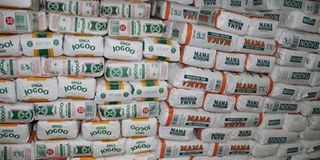Consumers to pay more for maize, wheat flour if new bill passed

The cost of ugali, bread and cassava is set to rise if the Tax Laws Amendment Bill, 2018 tabled in Parliament last month is passed and signed into law. The bill seeks to change tax status on maize, wheat and cassava from zero-rated to exempt. FILE PHOTO | DIANA NGILA |
What you need to know:
- The bill seeks introduction of tax exemption on supply of maize flour, ordinary bread and cassava flour, wheat flour.
- PwC said the overall effect of the government’s move will be an increase in the cost of basic commodities.
Last year, the Govt removed tax on bread, maize and wheat as year-on-year inflation surged to 9.04 per cent.
The cost of ugali, bread and cassava is set to rise if a bill tabled in Parliament last month is passed and signed into law.
The Tax Laws Amendment Bill, 2018 seeks to change tax status on maize, wheat and cassava from zero-rated to exempt.
But millers have warned that changing the Value Added Tax (VAT) status to exempt will lead to expensive flour, an added cost that will be borne by consumers.
“The impact of this move is that millers cannot recover VAT on input and hence increase in cost of flour, which will be passed onto consumers,” said Cereal Millers Association.
The bill seeks introduction of tax exemption on supply of maize flour, ordinary bread and cassava flour, wheat or meslin flour containing either of the ingredients by more than 10 per cent in weight.
COST OF LIVING
Audit firm PricewaterhouseCoopers (PwC) said the overall effect of the government’s move will be an increase in the cost of basic commodities.
“Whilst the bill will alleviate the burden of paying VAT refunds for the government, the proposed changes are bound to increase the cost of certain goods,” said PwC.
“As a general observation, if the bill is enacted into law, the overall net implication will be an increase in the prices of basic commodities such as flour, milk, bread...,” added the firm.
The price of bread has remained at Sh50 for a long time and the new bill, if adopted, will likely see a price increase.
“We want the government to rethink on the said amendments. They are not good to consumers who rely on these commodities every day,” said millers.
INFLATION
The move is likely to lead to an increase in cost of living as food takes up the largest share, 36 percent, of the basket of commodities used to calculate inflation.
Inflation dropped to a 63-month low in April, helped by a slower growth in average food prices compared with the same period last year.
In March 2017, the Treasury removed tax on bread, maize and wheat as year-on-year inflation surged to 9.04 per cent the previous month after drought drove up food prices.





